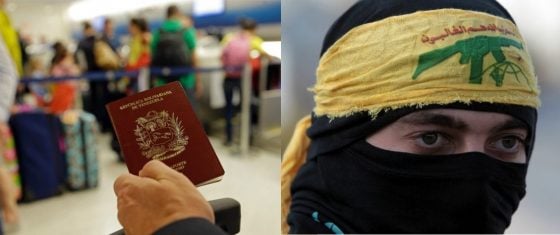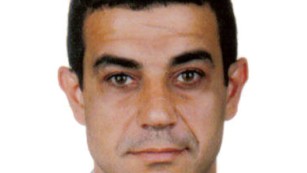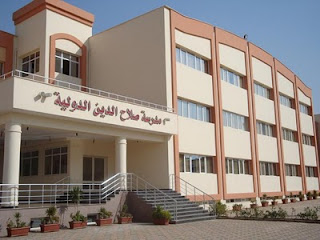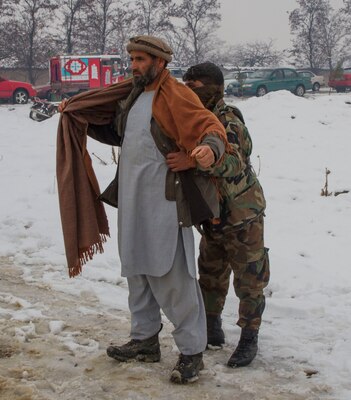
Venezuela may have given passports to people with ties to terrorism
Toledo, Spain (CNN): The stunning postcard-perfect vista surrounding Misael Lopez in this town about one hour from Madrid belies his constant anxiety, even fear.
That’s because the former legal adviser to the Venezuelan Embassy in Iraq is revealing secrets he says his government doesn’t want disclosed.“I’m concerned about my safety and my family’s safety everywhere I go,” Lopez said as he walked the cobble-stoned streets of Toledo.Lopez, 41, says he reported what he says was a scheme to sell passports and visas for thousands of dollars out of the embassy and repeatedly turned down offers to get a cut of the money. But it was the response from his government — which has denied his allegations — that surprised him the most.CNN and CNN en Español teamed up in a year-long joint investigation that uncovered serious irregularities in the issuing of Venezuelan passports and visas, including allegations that passports were given to people with ties to terrorism. The investigation involved reviewing thousands of documents, and conducting interviews in the U.S., Spain, Venezuela and the United Kingdom.One confidential intelligence document obtained by CNN links Venezuela’s new Vice President Tareck El Aissami to 173 Venezuelan passports and ID’s that were issued to individuals from the Middle East, including people connected to the terrorist group Hezbollah.The accusation that the country was issuing passports to people who are not Venezuelan first surfaced in the early 2000s when Hugo Chavez was the country’s president, interviews and records show.A Venezuelan passport permits entry into more than 130 countries without a visa, including 26 countries in the European Union, according to a ranking by Henley and Partners. A visa is required to enter the United States.Over the course of the CNN investigation, Lopez provided documents that show he repeatedly told Venezuelan officials about what he discovered. But he said instead of investigating his allegations, the government targeted him for disclosing confidential information. U.S. officials were also made aware of his findings.“You cannot be a cop, and a thief at the same time,” Lopez said. “I decide to be a cop and do the right thing.”Doing the right thing has cost him.Unwelcome surprise
It didn’t start out that way.Lopez, a lawyer who worked as a police officer in Venezuela, said he thought becoming a diplomat was a great career opportunity, which would also allow him to serve his country. With that in mind, he moved to Baghdad to start his new life at the Venezuelan Embassy.But, he recalled, he got an unwelcome surprise on his first day in July 2013.His new boss, Venezuelan Ambassador Jonathan Velasco, gave him a special envelope, he said.“He gave me an envelope full of visas and passports,” Lopez recalled. “He told me, ‘Get this, this is one million U.S. dollars.’ I thought it was like a joke. Then he told me here people pay a lot of money to get a visa or a passport to leave this country.”About one month later, Lopez said he realized it was no joke.An Iraqi employee of the embassy, who was hired to be an interpreter, told him she had made thousands of dollars selling Venezuelan passports and visas, he said. And he could make a lot of money, too.But Lopez said he told her it was wrong and he refused.The employee pressed the issue, telling him there were thousands of dollars to be made, he said, even discussing an offer to sell visas to 13 Syrians for $10,000 each.And, Lopez, said, she told him he could get a cut of the money, too.Again, he said he refused.“I suspect it might be terrorists; that’s why I reject, of course, immediately,” Lopez said.And he said it just got worse.Lists of names
Lopez said he was stunned when he found a document inside the embassy. It was a list of 21 Arabic names with corresponding Venezuelan passport numbers and Venezuelan identification numbers. A Venezuelan immigration official told CNN that a cross-check of the passport numbers indicated that the passports are valid and match the names on the list Lopez found — meaning the people on the list could be able to travel using those passports.But incredibly, a publicly available database in Venezuela examined by CNN shows 20 of the 21 identification numbers are registered to people with Hispanic names — not the Arabic names listed on the passports.Lopez kept investigating what was going on inside the embassy. He said he even found the case of a convicted drug dealer with an Iraqi identification certificate that appears to show he was born in Iraq. But the man had a Venezuelan passport that said he was born in Venezuela.He kept evidence and notes of what he found.Concerned that the passport and visa scheme was continuing without his knowledge, Lopez investigated the embassy employee who he said had offered to sell passports. He took photos of her desk where he says he found the embassy’s official stamp, used to authenticate visas, as well as sheets of papers printed with the Venezuelan government seal.He eventually fired the employee. Lopez did not have any other documents that would confirm the allegations against her.The employee did not respond to repeated requests from CNN for comment.In April 2014, only nine months after he started the job, he emailed a report to Ambassador Velasco about the alleged selling of passports and visas. By then, he said he was convinced that Velasco knew about what was going on inside the embassy.“He’s been there since 2008,” Lopez said. “How could he (have) been there so long, couldn’t notice that?”He said Velasco did nothing and even threatened to fire him.By 2015, frustrated that no one would investigate, he took what he found to Delcy Rodriguez, Venezuela’s foreign minister. His emailed report said there was “fraudulent issuing of visas, birth certificates and Venezuelan documents.”He said nothing happened.Going to the FBI
Eventually, with nowhere else to turn, Lopez contacted an FBI official at the U.S. Embassy in Madrid. The two met at a restaurant across the street from the embassy, and the official sent Lopez’s information to FBI headquarters in Washington, D.C., a law enforcement source said. The FBI would not comment about what happened with the information.For Lopez, it was his final attempt to get something done.But it was too late.By the end of 2015, the Venezuelan government accused Lopez of “abandoning his post” and removed him. A police official showed up at his home in Venezuela with a document that said he was under investigation for revealing “confidential documents or secrets.”Looking for answers
In an email, Velasco strongly denied Lopez’s allegations.“This embassy is ready open to be audit [sic] and investigated for any international organization and intelligent [sic] Services as well, I don’t have nothing to hide or fear. I be sure [sic] that under my duties this embassy don’t never [sic] and ever sell Venezuelan nationalities, this will be a joke for all the international security organization [sic] and we already cooperate with the (Iraqi) government and international intelligent [sic] service,” the email read in English.In an attempt to get answers, a team from CNN en Español traveled to Caracas last June. In a letter, the government restricted CNN’s coverage to stories related to tourism, weather, alternative energy sources and relations among the different government institutions in Venezuela.Rodriguez, the foreign minister, ignored reporter Rafael Romo when he tried to question her at a press event.A government official told the CNN en Español team that any questions about the passport allegations would be grounds for expulsion from the country.On a second visit to Caracas last August, a CNN en Español producer and videographer were forced to leave the country after Venezuelan authorities impounded CNN camera equipment at the airport.Last September, Rodriguez represented Venezuela at the United Nations General Assembly. Inside the UN, she again ignored CNN’s attempt to ask her questions.Finally, CNN was able to speak with her as she was walking with a small group on the sidewalk across from the UN. As she walked away from the crews, she said, “You’re going to hurt yourself for following the lies of a person who doesn’t know what he’s talking about.” She said allegations of selling passports and visas were “totally” false.But it’s not the first time allegations about Venezuelan passports have been made public.Links to terror
U.S. lawmakers heard reports about Venezuelan passport fraud during congressional hearings as far back as 2006. In fact, a congressional report warned, “Venezuela is providing support, including identity documents that could prove useful to radical Islamic groups.”And a state department report at the time also concluded that “Venezuelan travel and identification documents are extremely easy to obtain by persons not entitled to them.”Roger Noriega, the former US ambassador to the Organization of American States and former assistant secretary of state for Western Hemisphere affairs, said in prepared remarks before a congressional in 2012 that “Venezuela has provided thousands of phony IDs, passports and visas to persons of Middle Eastern origin.”Noreiga, who is now managing director of Vision Americas and works for a conservative think tank, told CNN that evidence began to emerge in 2003 in Venezuela that passports were being issued to non-Venezuelans.“I absolutely believe, and I state it so publicly, that if we do not get our arms around this problem, people are going to die, either our allies or our own personnel or facilities are going to be attacked by networks abetted by the Venezuelans,” Noriega said.The U.S. State Department declined CNN’s request late last year for an interview, instead emailing a link to its 2015 country terrorism overview. That report concluded, “There were credible reports that Venezuela maintained a permissive environment that allowed for support of activities that benefited known terrorist groups.”A 2013 confidential intelligence report from a group of Latin American countries obtained by CNN says that from 2008 to 2012, 173 individuals from the Middle East were issued Venezuelan passports and IDs. Among them were people connected to the terrorist group Hezbollah.The official who ordered the issuing of the passports, the report said, is Tareck El Aissami, who was appointed vice president of Venezuela in January. He is the former minister in charge of immigration as well as a governor.El Aissami “took charge of issuing, granting visas and nationalizing citizens from different countries, especially Syrians, Lebanese, Jordanians, Iranians and Iraqis,” the report said.He did not respond to multiple requests for comment.Another high-profile Venezuelan linked to terrorism is Ghazi Nasr Al-Din, a former Venezuelan diplomat who worked in the country’s embassy in Syria. He is “wanted for questioning” by the FBI for “his fundraising efforts” with Hezbollah contributors, according to a notice on the FBI website. The bureau confirmed that the information was still active, but would not comment further.U.S. officials say he has “facilitated the travel” of Hezbollah members to and from Venezuela, according to a 2008 press release from the U.S. Treasury Department.Leaks in the process
What allegedly happened in Iraq is no surprise to General Marco Ferreira, who was in charge of Venezuela’s immigration office in 2002.Today, Ferreira is living in Miami after being granted political asylum after he supported a 2002 failed coup against Venezuela’s then-President Hugo Chavez. He told CNN that he personally witnessed corrupt senior officials ordering passports for people who were not citizens when he was running the department. He added anyone could get a passport at a local office because each worked independently.He said it was “very easy” to assume someone else’s identity.“One of the problems was the corrupted people that was working in that place,” Ferreira said. “The second one was the fragility of the system because everything was very old and they have a lot of leaks in the process.”He said it was “very, very easy to go and be Venezuelan, or pretend being born in Venezuela.”Asked about what Misael Lopez described as the alleged passport and visa-selling operation at the Venezuelan Embassy in Iraq, he said he was not surprised.As for Misael Lopez, he’s living modestly in Spain, where he also has citizenship; he knows he can’t go back to Venezuela.With his safety always an issue, he still says he had to tell his story. And going public, he hopes, will help protect him and his family.“I did the right thing and I’m proud it,” he said. “No regrets at all.”



 NBC, Gulen’s home in Saylorsburg, PA.
NBC, Gulen’s home in Saylorsburg, PA.

